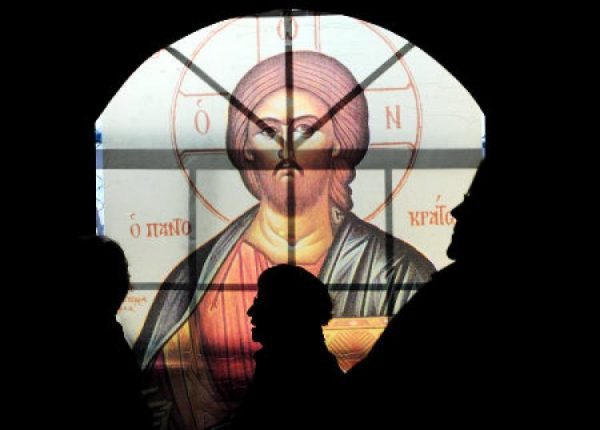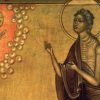The students entering seminary to begin their studies might ask “Why such a lofty topic?” “We came to seminary to become pastors and ministers, not scholars or academics.” And to them I respond, “You’re right.” Cummins has trained students for Christian ministry for over a century. Our goal is not to train scholars and theologians but to equip shepherds of the flock and servants of Christ in the vineyard of the Lord.
But is only the academic or scholar a theologian? Can the term apply to the non-specialist too? I think it can and does. According to the Greek definition of the word “theologian,” Theos means God and logos means word. Ultimately, Christian theology is an exacting articulation of the work of God because God is the Word and the Word is God.
First a word of caution. The Christian Church both East and West has granted the title “Theologian” — with an uppercase T — to only three scholars in two thousand years: John the Theologian (the Beloved Disciple of the Lord, 6-100AD), Gregory (Nazienzus) the Theologian (d.390AD), and Symeon the New Theologian (949–1022AD). The rest of us, even at our best, are relegated to the lowercase t status of theologian.
Bearing all this in mind and aware of the humility and even trepidation it should evoke, we also need to consider the great biblical examples such as John the Baptist who exemplified a life of prayer and fasting. Prayer and fasting is a theme found throughout scripture. Jesus instructed the Disciples that “except by prayer and fasting” could they do mighty works in His Name. It extends into the life of the Church beyond the book of Acts as well and illustrates what the fourth century Desert Father Evagrios Pontikos wrote, “A theologian is one who truly prays and one who prays is a true theologian.”
The Five Tasks of the Theologian
So what are the five tasks of a theologian in the twenty-first century? The first task is to be a man or woman of prayer. Only in the solitude of prayer can we participate in the life of the Holy Trinity. Only as we approach the unity and harmony that the Father, Son, and Holy Spirit share together can we find harmony in our own lives where wisdom, peace and discernment can be discovered and flourish.
The second task of the theologian is to proclaim the evangelion (the Gospel; literally in the Greek the Good News). The theologian is called to proclaim the Good News to a bad news world. The Good News at its foundation is that Jesus Christ has risen from the dead. This the central message which proclaims the most transformative event of history; one that changes not only individual lives but cultures, nations, even civilizations.
Everyone is invited into the new life offered through this tranformative event and the first entry way is the preaching of the Gospel — the Good News must be heard before one can step into the life it proclaims. The partaking of this Gospel, this movement into new life is the experience of Him whom it proclaims. The Gospel then is something that must first be heard, then believed, and then acted upon. The Apostle Paul writes in Romans how Jesus is the fulfillment of the Messianic promise (chapters 3-4). In 1 Corinthians the Apostle writes how the True God has become King in the Person of Jesus thereby redeeming and transforming fallen humanity (chapter 15).
Christians live between the Anastasis (Resurrection), the event that transformed all living creatures, and the the Defteri Parousia (Second Coming) when Christ will come again but this time in glory. He returns as a reigning King to inaugurate a new kingdom that will reconcile the entire cosmic creation back to Him and which we believers in some measure already experience.
The third task of the theologian is to help people live in reality and not to be in plani (spiritual delusion). Plani is increasing in our day although every generation battled it in one way or another. The Bible says that the Truth will set you free but it is important to remember that Jesus said, “I am the Truth.” Theology, then, cannot be reduced to abstract concepts alone. It has value only if it references and draws from Him who is the Truth — Jesus Christ. Real theology is not merely a collection of words about God but must illuminate and reveal the concrete, existential content of real encounter with the Risen Christ who can liberate and transform of the believer.
Spiritual delusion enters when theology abandons this charismatic and transformational dimension of communion with God. The believer is led back into the brokenness of the fallen world when this dimension is denied or when awareness of it grows dim. The Apostle Paul says transformation begins with our minds or nous in Greek (Romans 12:2). The mind must descend into the heart the Fathers of the Church teach, and we must develop the fronema or mindset of repentance at the foot of the cross of Christ in order to experience the post-resurrectional power and joy that Christ offers. Through the cross joy comes into the world and this is as true of the lowly believer as it was with Jesus when he endured His extreme humiliation hanging on the cross.
The fourth task of the theologian is to be a vessel of the Holy Spirit’s divine love, power and grace. Without obedience to God, the theologian will not be a fountain of mystical refreshment but rather a barren desert of empty facts bereft of real meaning. Jesus has to be the center of everything that the theologian says and does.
We do not worship a creed, scripture, church, philosophy, theology or social gospel, but rather we worship a Person and that Person is Jesus Christ — The Alpha and the Omega, the beginning and the end, as St. John the Theologian tells us in his Revelation written on the island of Patmos.
Finally, the fifth task of the theologian is to be rooted in scripture and to be nourished sacramentally. The chapel must be the most important building on campus for every student. Only with this focus does a person remain grounded in his mission and can ascend toward meaningful theology.
Theology Begins With Prayer and Worship
I remember Fr. Thomas S. Acker, the President of Wheeling Jesuit University, my alma mater, remarking that when he first arrived on campus he decided that the building that had to be completed next was the chapel. The chapel he said is the center of a Christian university campus. He recalled Jesus’ words, “Seek first the Kingdom of God and His righteousness and everything else will be added to you,” (Matthew 6). This is the only way we can fulfill our call first as Christians and next as theologians.
These characteristics of a theologian may sound like a impossible order if we attempt them on our own. Yet, if we trust and rely on God’s strength, all things are possible. Keep praying and seeking our Lord’s direction as you begin this academic year. Consider these words of St. John Chrysostom: “He who is able to pray correctly, even it he is the poorest of all people, is essentially the richest. And he who does not have proper prayer, is the poorest of all, even if he sits on a royal throne.”
John G. Panagiotou is a Greek Orthodox theologian, scholar and writer. He is a graduate of St. Vladimir’s Orthodox Theological Seminary and Wheeling Jesuit University. Panagiotou is Lecturer in New Testament Greek at Cummins Theological Seminary.















